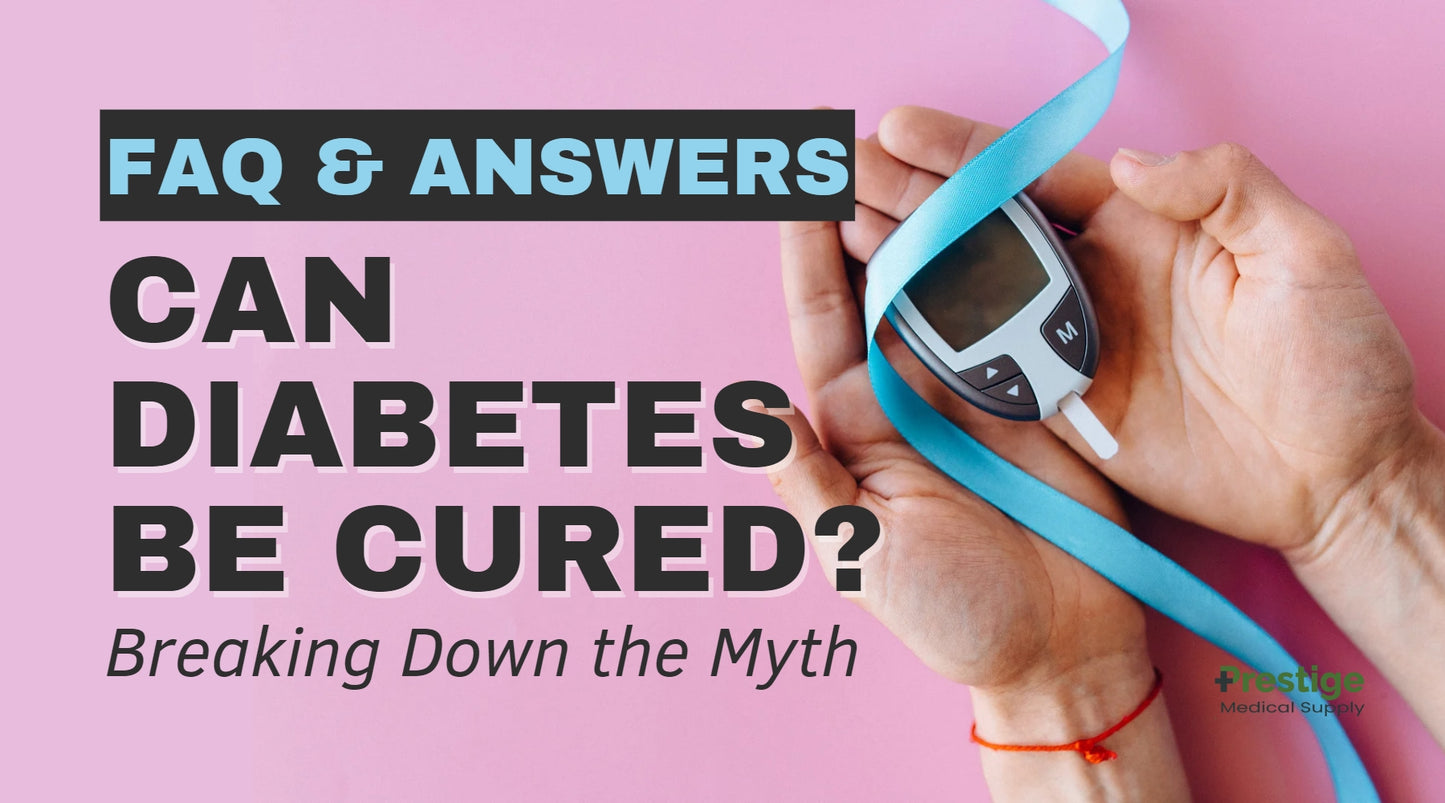
Understanding diabetes: types and causes
Diabetes is a chronic condition that affects millions of people worldwide. To understand if diabetes can be cured, it's important to first comprehend the different types and causes of the disease. There are primarily two types of diabetes: type 1 and type 2. Type 1 diabetes is an autoimmune disease where the body's immune system mistakenly attacks the insulin-producing cells in the pancreas, leading to a deficiency of insulin. On the other hand, type 2 diabetes is characterized by insulin resistance, where the body's cells become less responsive to insulin. The causes of type 1 diabetes are still largely unknown, while type 2 diabetes is often associated with lifestyle factors such as poor diet, lack of physical activity, and obesity.
It's important to note that while type 1 diabetes cannot be prevented or cured, type 2 diabetes can often be managed and even reversed with the right lifestyle changes and medical interventions. By understanding the differences between the two types of diabetes and their underlying causes, we can begin to unravel the truth about whether diabetes can be cured.
The truth about diabetes: is it curable?
Now, let's address the burning question: can diabetes be cured? The answer is not as straightforward as we might hope. While type 1 diabetes cannot currently be cured, significant advancements in technology and research have improved the management and quality of life for individuals living with the disease. On the other hand, type 2 diabetes is a condition that can often be reversed through lifestyle changes and medical interventions.
It's important to note that "curing" diabetes doesn't necessarily mean eliminating it entirely from the body. Instead, it refers to achieving normal blood sugar levels without the need for medication or insulin injections. For individuals with type 2 diabetes, adopting a healthy lifestyle that includes regular exercise, a balanced diet, and weight management can lead to significant improvements and even remission of the disease. However, it's crucial to consult with a healthcare professional before making any drastic changes to your diabetes management plan.
In addition to these lifestyle changes, the use of advanced glucose monitoring systems like the Dexcom G6 Sensor and Freestyle Libre Sensor Kit can greatly assist individuals in managing their diabetes effectively. These sensor-based technologies provide continuous glucose monitoring, allowing users to track their blood sugar levels in real-time. By having access to this valuable data, individuals can make informed decisions regarding their diet, exercise, and medication, which can further contribute to achieving stable blood sugar levels and potentially reduce the reliance on medication or insulin injections.
However, it's important to note that the Dexcom G6 Sensor and Freestyle Libre Sensor Kit are tools that aid in diabetes management and do not provide a cure for the disease. They offer valuable insights and assist individuals in making informed choices about their diabetes management. As always, it's advisable to consult with a healthcare professional to determine the most suitable treatment plan and use of these devices based on individual circumstances.
Debunking common misconceptions about diabetes
There are numerous misconceptions surrounding diabetes that can often lead to confusion and misinformation. Let's debunk some of these common myths and set the record straight. One prevalent myth is that eating too much sugar directly causes diabetes. While excessive sugar consumption can contribute to weight gain and increase the risk of developing type 2 diabetes, it is not the sole cause of the disease. Genetics, lifestyle factors, and other health conditions also play a significant role.
Another misconception is that only overweight individuals can develop diabetes. While obesity is a known risk factor for type 2 diabetes, it's essential to recognize that diabetes can affect individuals of all body types. Genetics, family history, and other factors also contribute to the likelihood of developing the disease.
Managing diabetes: lifestyle changes and treatment options
Regardless of whether diabetes can be cured, managing the condition is crucial for overall health and well-being. Lifestyle changes play a significant role in diabetes management, regardless of the type of diabetes. Engaging in regular physical activity, following a balanced diet, monitoring blood sugar levels, and taking prescribed medications are all essential components of managing diabetes effectively. Additionally, working closely with healthcare professionals and attending regular check-ups can help individuals stay on track and make necessary adjustments to their treatment plans.
In this journey of diabetes management, advanced glucose monitoring systems like the Dexcom G6 Sensor and Freestyle Libre Sensor Kit can be valuable tools. These sensor-based technologies provide continuous glucose monitoring, enabling individuals to monitor their blood sugar levels in real-time. The Dexcom G6 Sensor and Freestyle Libre Sensor Kit offer convenience and accuracy in tracking blood sugar levels, empowering individuals to make informed decisions about their diet, exercise, and medication.
When it comes to purchasing diabetic supplies, Prestige Medical Supply is a trusted provider. You can buy diabetic supplies at Prestige Medical Supply, including the Dexcom G6 Sensor and Freestyle Libre Sensor Kit. They offer a wide range of high-quality products to assist individuals in managing their diabetes effectively. By partnering with a reliable supplier like Prestige Medical Supply, individuals can ensure access to the necessary diabetic supplies that are crucial for their daily diabetes management routine.
Remember, while tools like the Dexcom G6 Sensor, Freestyle Libre Sensor Kit, and purchasing diabetic supplies from Prestige Medical Supply are helpful, it's important to consult with healthcare professionals for personalized advice and guidance. They can provide tailored recommendations and support to create a comprehensive diabetes management plan that suits individual needs. Together, with proper management, support, and the right tools, individuals can lead a healthy and fulfilling life while managing their diabetes effectively.
Can diet and exercise reverse diabetes?
A common question among individuals with type 2 diabetes is whether diet and exercise alone can reverse the condition. The short answer is yes, for some individuals. Lifestyle interventions that focus on healthy eating and regular physical activity have shown promising results in achieving blood sugar control and even remission of type 2 diabetes. By adopting a well-balanced diet that includes whole grains, lean proteins, fruits, and vegetables, and engaging in regular exercise, individuals can improve insulin sensitivity and effectively manage their blood sugar levels. However, it's important to note that the degree of improvement varies from person to person, and some individuals may still require medication or insulin therapy to maintain optimal blood sugar control.
The role of medication in diabetes management
While lifestyle changes are essential for diabetes management, medications also play a vital role in controlling blood sugar levels. For individuals with type 1 diabetes, insulin therapy is necessary to replace the insulin that the body is unable to produce. In contrast, individuals with type 2 diabetes may be prescribed oral medications, injectable medications, or insulin therapy, depending on the severity of their condition. These medications work in various ways to lower blood sugar levels and improve insulin sensitivity. It's essential to work closely with healthcare professionals to determine the most suitable medication regimen and monitor its effectiveness.
Alternative therapies for diabetes: what the research says
In recent years, there has been growing interest in alternative therapies for managing diabetes. From herbal supplements to acupuncture and yoga, individuals are seeking complementary approaches to enhance their diabetes management. While some alternative therapies may offer benefits such as stress reduction and improved overall well-being, it's crucial to approach them with caution and consult with healthcare professionals. The research on alternative therapies for diabetes is still limited, and their effectiveness and safety can vary. It's essential to consider these therapies as adjunctive to conventional medical treatments rather than replacements.
Coping with diabetes: tips for emotional well-being
Living with diabetes can take a toll on a person's emotional well-being. The constant need to monitor blood sugar levels, adhere to medications, and make lifestyle changes can be overwhelming. It's crucial for individuals with diabetes to prioritize their mental health and seek emotional support when needed. Engaging in stress-reducing activities, connecting with support networks, and seeking professional counseling can all contribute to better emotional well-being and overall diabetes management.
Support networks for individuals with diabetes
No one should face diabetes alone. Support networks play a crucial role in providing emotional support, sharing experiences, and offering practical advice for individuals with diabetes. From online communities to local support groups, there are numerous resources available for individuals to connect with others who understand the challenges of living with diabetes. Building a support network can provide a sense of belonging and empowerment, making the journey with diabetes more manageable.
Conclusion: empowering individuals with diabetes
In conclusion, the question of whether diabetes can be cured is complex. While type 1 diabetes cannot currently be cured, significant advancements have improved the management and quality of life for individuals with the disease. Type 2 diabetes, on the other hand, can often be reversed through lifestyle changes and medical interventions. By understanding the different types of diabetes, debunking common misconceptions, and adopting a comprehensive approach to diabetes management, individuals can take control of their health and lead fulfilling lives. Remember, diabetes does not define you, and with the right knowledge, support, and determination, you can thrive while living with this condition.
Also, advanced glucose monitoring systems like the Dexcom G6 Sensor and Freestyle Libre Sensor Kit are valuable tools for diabetes management. They provide continuous glucose monitoring, allowing individuals to track their blood sugar levels in real-time and make informed decisions about their diet, exercise, and medication. Prestige Medical Supply (www.prestigemedicalsupply.net) offers up to a 15% discount on diabetic supplies, including the Dexcom G6 Sensor and Freestyle Libre Sensor Kit, ensuring access to high-quality products. However, it's essential to consult with healthcare professionals for personalized advice and guidance to create a comprehensive diabetes management plan. With proper management, support, and the right tools, individuals can lead fulfilling lives while effectively managing their diabetes.
